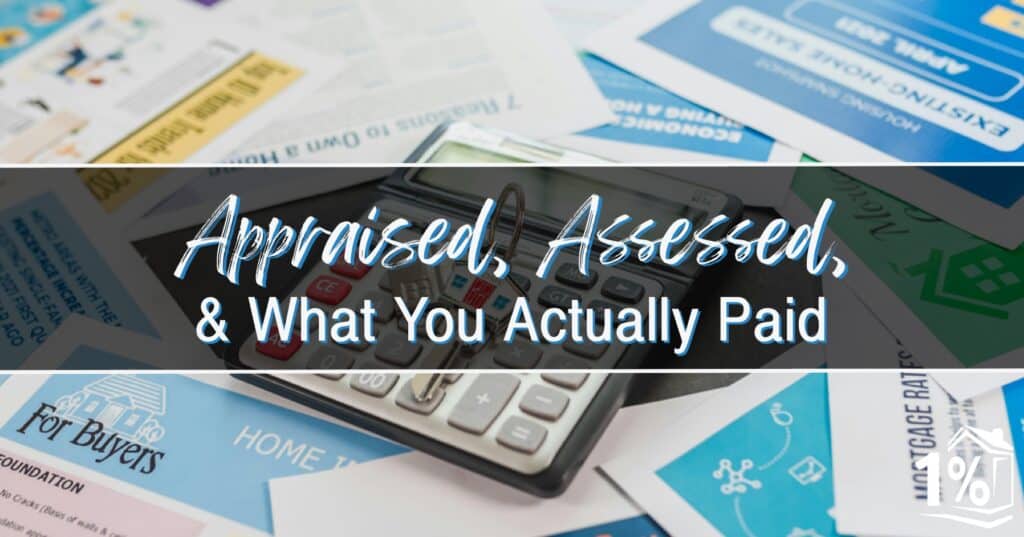Why Home Values Confuse Buyers… And What to Do About It
You found the perfect house in Columbus. The layout works, the price is within budget, and your offer just got accepted. You’re on cloud nine… until your lender says the home “appraised for less than expected.” Then you see the county tax records and notice an “assessed value” that’s even lower than both. Suddenly, three different numbers are being thrown at you -and none of them match. What gives?
If you’ve ever felt confused (or frustrated) by the whirlwind of home values during the buying process, you’re not alone. We’re realtors that help people cut through the noise of the real estate world, I’m here to explain why these numbers exist, what they mean, and -most importantly- how to make sense of them.
The 3 Home Values Every Buyer Encounters
1. Appraised Value: The Lender’s Lens
The appraised value is the number your lender cares about most. After your offer is accepted, your mortgage provider hires a licensed appraiser to determine how much the home is “worth” based on comparable recent sales and property features. Their goal isn’t to tell you what a house could sell for -it’s to protect the bank from lending more than the home is actually worth.
Key things to know:
-It’s objective, but it can be conservative -especially in fast-moving markets.
-It directly impacts your loan: if the appraisal comes in lower than your offer, you’ll need to cover the difference or renegotiate with the seller.
-It’s a snapshot, not a prophecy.
2. Assessed Value: The Government’s Estimate
The assessed value is what your county or municipality uses to calculate property taxes. It has almost nothing to do with how much you paid or how much you could sell the home for. Think of it as a bureaucratic baseline.
In Columbus and throughout Indiana, assessed values often run significantly lower than the market price. That’s because they’re based on mass appraisal models, historical data, and -let’s be honest- some outdated assumptions.
Key things to know:
-It affects your annual tax bill, not your loan or sale price.
-Lower assessed value = lower taxes (often a good thing).
-You can appeal it if you believe it’s incorrect.
3. Purchase Price: The Market’s Truth
At the end of the day, the purchase price -what you agreed to pay- is the real value. It reflects what a willing buyer and seller decide in real time, based on everything from condition to emotion to competition.
Key things to know:
-It reflects local demand, not formulas.
-It may be higher or lower than both appraisal and assessment—and that’s okay.
-It’s influenced by what’s happening right now in the Columbus housing market.
Why These Numbers Rarely Match -And Why That’s Normal
These values exist for different reasons, calculated by different people, at different times. So it makes perfect sense that they rarely align.
-Appraised values often lag behind when the market is rising fast -because they’re based on past sales.
-Assessed values may be years old, only updated during certain tax cycles.
-Purchase price reflects urgency, timing, and negotiation -things formulas can’t capture.
How Buyers Can Stay Grounded
1. Ask Questions Early and Often
Never hesitate to ask your agent what a number means or why it’s different. The more you understand, the more confident you’ll be.
2. Use the Appraisal Strategically
If it comes in low, you may be able to negotiate with the seller for a price reduction or closing credit. If it comes in high? Great -instant equity.
3. Don’t Sweat the Assessment
A lower assessed value might make your taxes more affordable. It’s not a red flag -it’s an opportunity.
And if it’s too low or too high? You can appeal it through the county.
4. Focus on Your Goals, Not the Noise
Ultimately, your home’s value is what it means to you -in location, layout, opportunity, and lifestyle. Use these numbers as tools, not as deal-breakers.
The Real Value Comes from Clarity
The Columbus housing market -like the rest of the Midwest- is filled with nuance. It’s fast-changing but grounded in practical value. And when you understand the difference between appraised, assessed, and actual values, the process gets a whole lot clearer.
You deserve to feel empowered -not overwhelmed- when buying a home. If you’re ready to make your move and want someone in your corner who can explain every number, negotiation, and nuance, we’d love to help.
Let’s talk. Your next home might be closer than you think.

